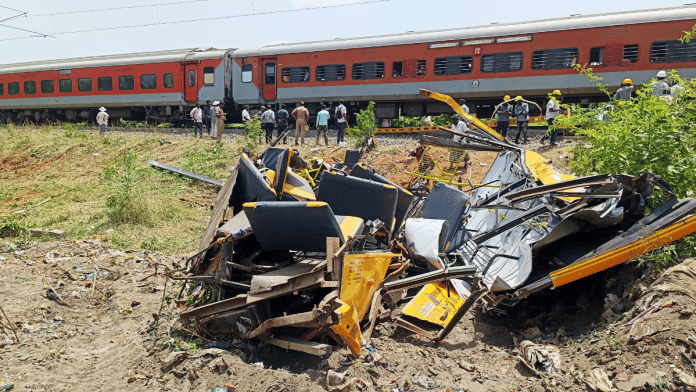New Delhi: The Modi government has justified its rules mandating disbursal of railway accident compensation only to bank accounts without a cheque book or debit card, calling it a measure to protect victims or their families from exploitation.
In an affidavit submitted to the Supreme Court earlier this week, the railway ministry said that the Railway Accidents and Untoward Incidents (Compensation) Rules, originally framed in 1990, were amended in 2020 with an intention to shield claimants from being fleeced by their lawyers, and to ensure judicious use of the compensation money.
The amendment was also made in view of an alleged Rs 50-crore compensation money scam unearthed in Patna in 2019 that involved a judicial member serving in the Railway Claims Tribunal (RCT) and lawyers practicing there, according to the affidavit.
The Centre’s affidavit came in response to a petition filed by a Lucknow-based association of lawyers, fighting cases on behalf of rail accident victims. The petition contended that such “rigid application” contradicted the intent of the amendment.
The compensation policy works on the assumption that withdrawing money without a debit card or cheque book would require in-person verification, making it harder for touts to control victims’ bank accounts.
An enquiry into the Patna case conducted by then Supreme Court judge U.U. Lalit—who later served as Chief Justice of India—had highlighted various malpractices at the local RCT bench, and did not rule out complicity between the RCT member and lawyers.
Following the report, the member was dismissed from service and is now facing CBI prosecution in a court there. Lawyers identified as co-conspirators are also facing trial in the same court, the railway ministry said in its affidavit.
Also Read: 2.6 lakh people died in rail accidents in India in past 10 yrs. Most weren’t killed in collisions
What’s in ministry’s latest submission
The lawyer association’s petition challenges two key modifications in the Railway Accidents and Untoward Incidents (Compensation) Rules, 2020.
While one is related to the need for an archaic banking system for claiming monetary compensation in railway accident cases, the other pertains to the mechanism of the disbursal system. The tribunal, depending upon the financial need and status of a claimant, may release a portion of the compensation immediately and keep the rest in FDRs (Fixed Deposit Receipt) or annuities.
The rules suggest that the tribunal could release 10 percent of the compensation as a first instalment.
However, according to the lawyers’ petition, RCTs have interpreted this guideline—meant to safeguard compensation amounts through structured disbursal methods—in an arbitrary and mechanical manner.
Moreover, the petition further claimed, RCTs have adopted the guidelines as a binding norm regardless of individual circumstances of the claimant. Such a “rigid application not only contravenes the intent of the amendment but also inflicts grave injustice upon victims and their families, many of whom are from rural and economically disadvantaged backgrounds,” it said.
Though, upon receiving appeals, high courts have stepped in to rectify RCT orders and disburse larger compensation amounts, the fact that claimants are compelled to approach courts for this has resulted in avoidable litigation. Besides, it adds a layer of unnecessary burden on the claimants, who are already facing the strain of fighting a claim case before the RCT, the petition said.
It also argued that such an interpretation also restricts the options of financially literate individuals who may prefer to invest in other avenues. “This one-size-fits-all approach is arbitrary, because it lacks a rational nexus to the objective of protecting compensation,” it contended.
Accusing the lawyers of attempting to “find a new veneer to secure legitimacy to their own criminal deeds”, the Centre said the structured disbursal system was added to disincentivise middlemen and touts who stick to the family of beneficiary until they do not get their share of the money.
Even the need for a beneficiary to have a bank account at the place of his permanent residence and not where he/she works was added with the same purpose, the government said.
The Centre’s affidavit also cited a survey showing that 40 percent of railway accident compensation claims were filed in RCTs located in Uttar Pradesh, suggesting possible connivance among lawyers practicing in the state for personal financial gain.
The government said that in cases of dire need and necessity, RCTs have been releasing the amount of the FDR in favour of beneficiaries to enable them to meet their day-to-day exigencies or suddenly incurred expenses. In this backdrop, it said, no judicial intervention was required to test the validity of the rules.
(Edited by Ajeet Tiwari)
Also Read: What Indian Railways needs right now—safety more than speed







I have seen this process first hand and that too in the city where the scam was unearthed in 2019. Let me share that advocates are still using loopholes. Rather than breaking FDs they simply sit on the compensation cases and those are not forwarded until a percentage of compensation amount sought is made to them. It is a an utterly shameful attitude of the “sarkari” system which still keeps behaving like it works for some British babu. What the Center is trying to avoid is just one specific way of scam but then loophole still exists ! It is strange that biometric based disbursal for compensation is not done !